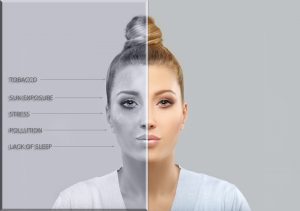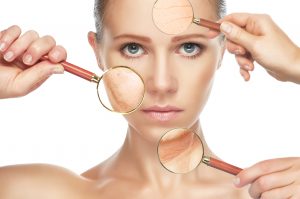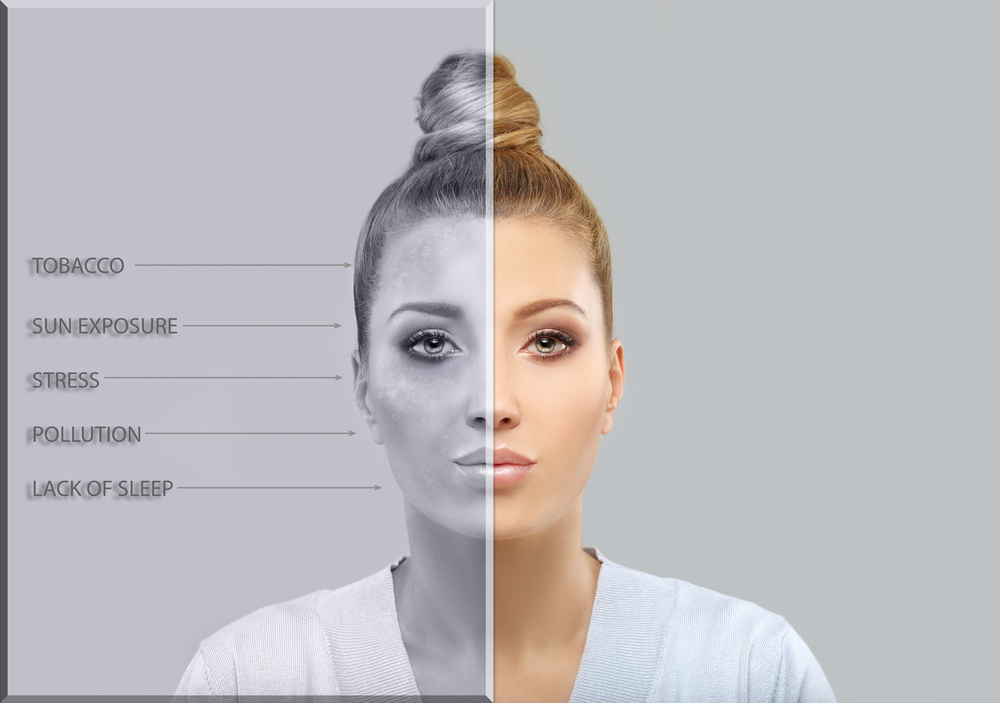Unlike internal effects of ageing that are beyond our control such as genetics, external causes of ageing can be minimised. Below is a summary of the top external effects on ageing.

Skin Damage From the Sun
The most well known external effect on skin ageing is the sun the UV radiation. The sun‘s rays penetrate the skin and cause DNA changes had a cellular level, these changes happen deep within the dermis so can take many years to show through. The most common signs of UV damage are brown pigmented lesions, wrinkles, broken capillaries and uneven skin texture. The worst of this damage is melanoma or other forms of cancer. UV damage doesn’t always happen on a hot sunny day. It is an accumulation of the number of UV hours your skin is subjected to. Often on an overcast day, the UV index can still be high so it’s important to wear sunscreen every day and if out in the sun to wear hats and protective clothing.
Effects of Smoking on Skin
Smoking is another external cause of skin ageing. When you smoke the nicotine in cigarettes aggravates the small vessels of our vascular system causing them to shut down. This then means that the skin doesn’t get the correct amount of oxygen and nutrients, as these are carried to the skin by the small vessels. If the skin doesn’t have enough oxygen and nutrients it can’t rebuild efficiently and we lose collagen and elastin as the skin hydrating molecule hyaluronic acid.

Effects of Alcohol on Skin
A few wines on a Saturday night might make a skin a little flushed and a little bit dry the next morning but won’t have much long-term effect on the skin. Regular drinking however can have devastating effects on the skin and ageing. Alcohol can create toxins in the body causing inflammation. This can manifest in your skin as bloating, puffiness, acne, redness, flushing and premature ageing. Dehydration from regular alcohol consumption can enhance wrinkles in the skin. The great thing is if you give up drinking, the skin can recover but it does depend on how much damage has been done in the first place. Once you destroy collagen it’s hard to get it back.
Long-term and Short-term Effects of Stress on Skin
The last external effect on the skin we will talk about today is stress. Everybody can feel stressed from time to time and this won’t have much effect on the skin. Chronic stress however can have devastating effects. Firstly the hormones that are produced when you’re stressed can lead to physiological changes that negatively impact your skin. The hormone cortisol which is produced when stressed can assist in stimulating oil release from the sebaceous glands making your pores clog and lead to acne. Stress can also cause sleep deprivation which has been scientifically shown to increase the signs of ageing including fine lines, dehydration and even pigmentation. Stress has also been shown to slow down the skin’s barriers ability to heal itself and protect the skin, this can also make the skin dry and itchy enhancing wrinkles.


